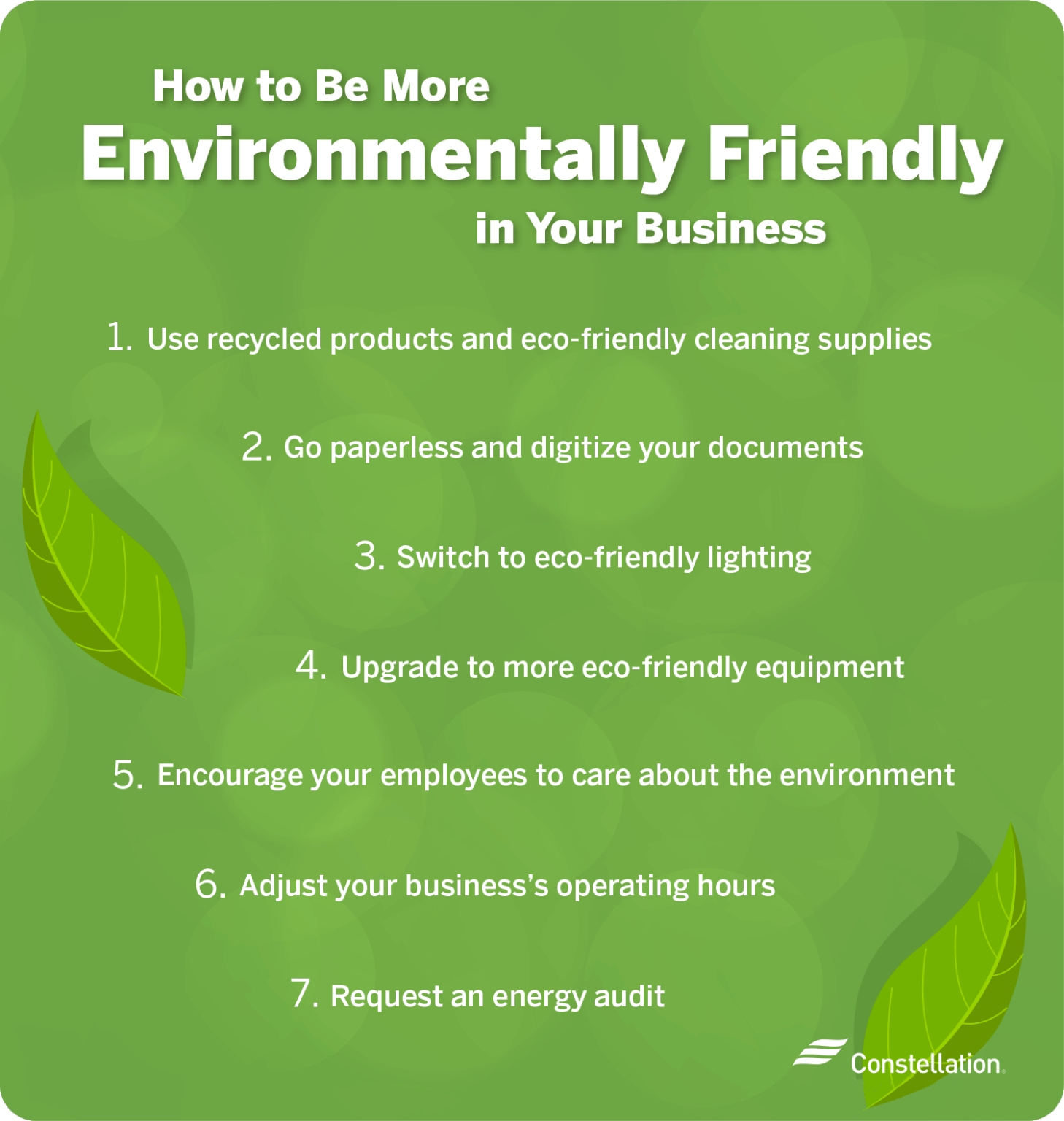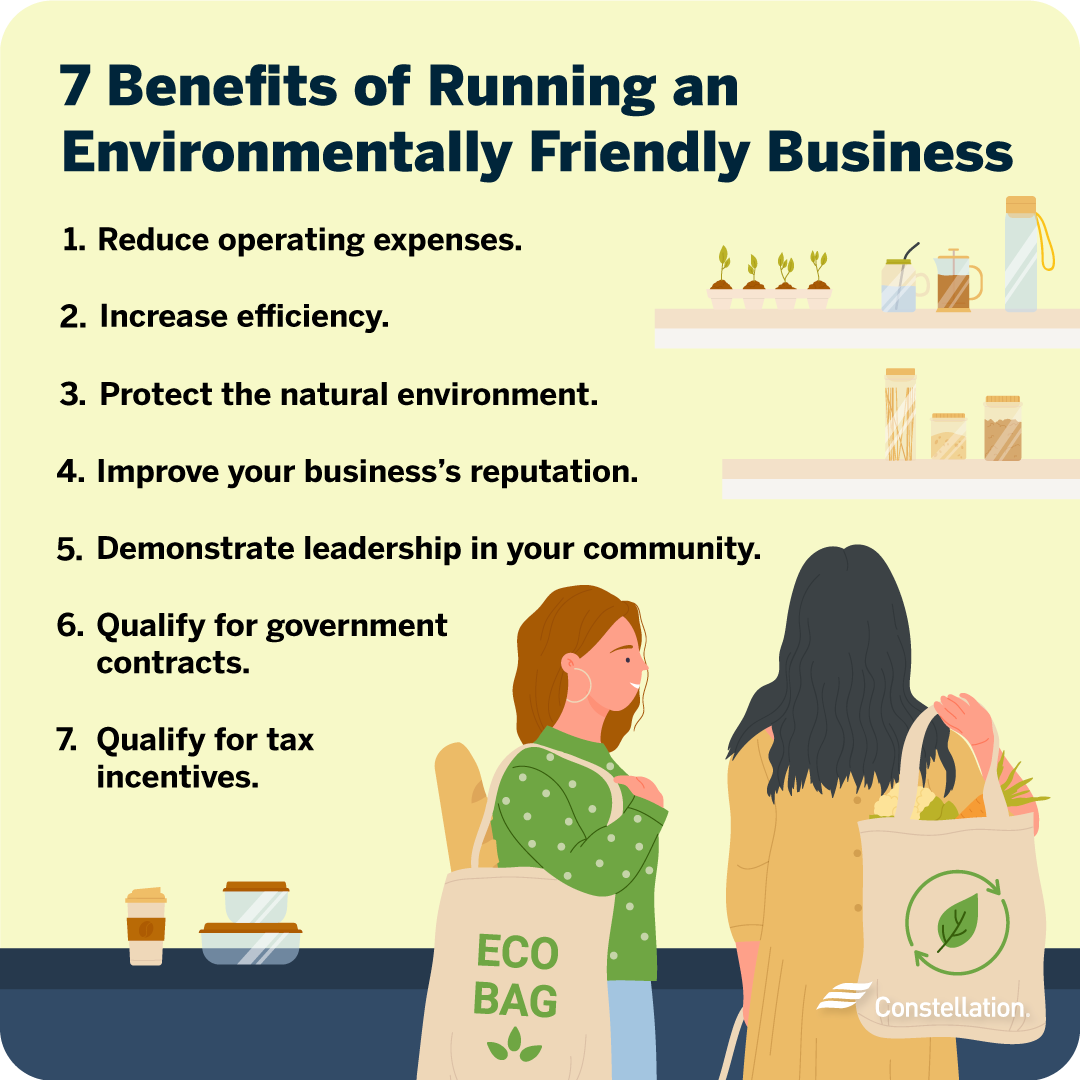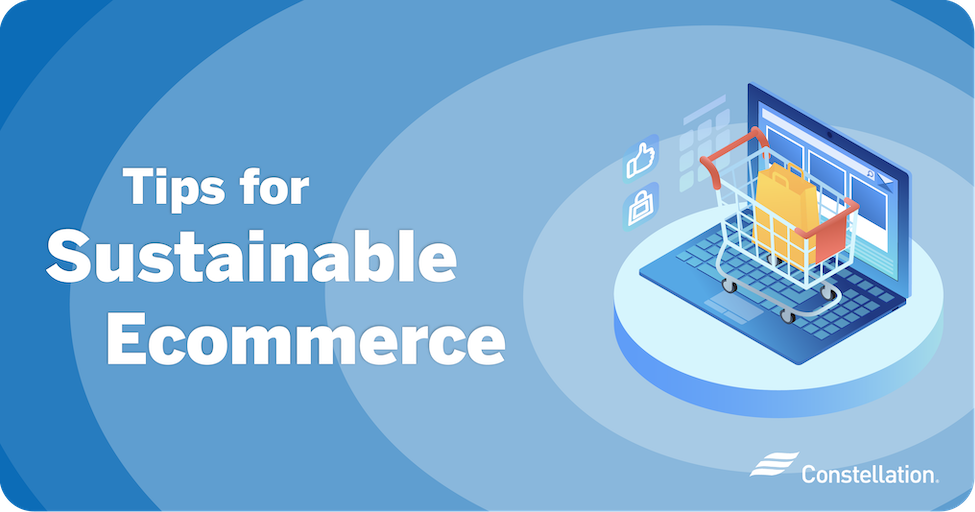
- Category:
Small Business Energy Savings -
Last updated:
August 20, 2024
15 Environmentally Friendly Business Practices that Promote Sustainability
Environmentally friendly business practices are good for your business. They improve the efficiency of your operations and may help you keep a lid on your costs. And because customers value eco-friendly business practices, you can gain a competitive edge as well. While your business benefits, you will also benefit your local community and the planet.
What are environmentally friendly and sustainable business practices?
While environmentally friendly business practices and sustainable practices in business are related and overlapping, they are different.
Sustainable small business practices are the strategies and actions you can take to minimize the impact your operations have on the environment. Sustainable workplace practices balance economic growth with environmental stewardship and social impacts.
They take a broader approach than eco-friendly business practices, which focus more directly on the environment, specifically reducing pollution, conserving resources, and protecting ecosystems.
Ways to be more environmentally friendly in your business

Finding ways to employ environmentally friendly business practices, even by making small changes in the way you operate, has a positive impact on the environment.
The following examples of sustainable small business practices can help get you started. Whether you adopt one strategy, or develop an expanded plan that builds over time, these initiatives can help improve your bottom line and your reputation with customers.
1. Go digital
Eliminating paper documents and files is one of the easiest environmentally friendly business practices you can implement right away. By going paperless in your business, you cut down on waste. You will also go through a digital transformation that improves efficiency, reduces errors and gives you the ability to measure and analyze your operations.
You can add to your efficiency, and the resiliency and scalability of your business, when you move to the cloud. You won’t just eliminate paper clutter, you’ll be able to access business information anywhere and anytime, improving your ability to collaborate.
2. Implement a recycling program
Recycling is one of the examples of environmentally sustainable workplace practices that works for your bottom line as much as it does for the environment. When you recycle old equipment and devices, you keep toxic metals out of the environment and out of landfills. It is a truly environmentally safe business practice. When recycling your old office equipment, you are also playing a critical role in the circular economy. While recycling electronics is important, you can expand and implement a recycling program for paper, plastics, metals, and textiles, as well.
3. Switch to clean energy
Environmentally friendly examples in the workplace also include relying on a clean energy source for some or all of your power. You don’t have to invest in putting up solar panels or wind turbines, though that can be practical and profitable for some companies. You can buy renewable energy certificates and sign up for a clean energy plan with your energy provider. When you actively participate in using and generating clean energy, you both support a healthier environment and contribute to creating viable clean energy markets.
4. Use energy-efficient lights
Today’s energy-efficient lights are affordable, safe and offer high quality light. For many companies, lighting makes up a large portion of a small business’s energy consumption. Switching to CFL or LED lights reduces the energy used to light your place of business and reduces heat, which is helpful during the hot days of summer. While the initial costs are higher than incandescent lighting, the long-term environmental and financial benefits of energy-efficient lighting make it worth the investment. Indeed, it is one of the lower cost, higher impact sustainable practices in business that lowers your carbon footprint and makes your business more environmentally friendly.
5. Encourage remote work
Reducing the miles your employees commute and the power they consume at your place of business contributes to an environmentally friendly business. Remote staff have a carbon footprint up to 58% lower than those working onsite. If you can implement a hybrid office/home plan, you may be able to lower your carbon footprint by 11-29%.
6. Use eco-friendly products and packaging
Consider the products you frequently use and replace them with eco-friendly and environmentally safe alternatives. Cleaning products with natural and eco-friendly alternatives, including disinfectants that are effective at killing the coronavirus, are widely available. Reference the EPA’s Safer Chemical Ingredients List for products that contribute to a safe workplace. You can also find recycled printer toner cartridges, recycled paper, and everything from furniture to decor that use post-consumer waste.
7. Conduct an energy audit
Performing an energy audit in your small business is an effort that more than pays for itself. You may find a professionally conducted audit to be the most convenient. However you can do a reasonably good job yourself. The audit will uncover areas where you can have the greatest impact, balanced against cost. An energy audit will also help you prioritize, budget and plan for more expensive and challenging changes over time.
One of the advantages of having a professional come in to analyze your energy patterns is that you can find the best areas for improvement. As with a home energy audit, you can contact your utility about coming out to conduct a business energy audit—often free of charge. A professional will identify air leaks that could be sealed, areas that may need more insulation and places where you could switch to energy-efficient lighting. They can give you a much better idea of how your business is using energy now and how you can save in the future. And lowering your energy usage lowers your carbon footprint.
8. Upgrade to high-efficiency appliances
Older office equipment and appliances consume more energy than newer models. Replacing them with newer units is one of the examples of environmentally sustainable work practices that also saves you money. When you transition to energy-efficient office equipment that’s designed to conserve power, like eco-friendly computers, printers or surge protectors and high-efficiency appliances, your business can use less power.
9. Reuse items whenever possible
In many cases, single-use items are a waste. Use ceramic mugs vs. paper cups. Replace plastic bottles of spring water with a water filter and reusable glasses. Reuse boxes. Turn scrap paper into note paper. Refurbish furniture instead of replacing it.
10. Compost organic waste
Composting organic waste, such as coffee grounds and leftovers from employee lunches, is a way to get employees involved in your environmentally friendly business practices. If it is possible at your site, you might start a small community garden or window herb garden for employees to harvest or for your restaurant or coffee shop to use.
11. Involve your employees and customers
Some of the best ideas may come through engaging your customers in sustainability and involving your employees in energy-saving practices. When you empower people to contribute ideas and get them involved in new processes, you might be amazed by their creativity and their willingness to take action. You can connect with employees through workplace sustainability signs and motivate them with rewards. Some companies have had success with employee commuter benefits programs.
12. Unplug electronics or use the “sleep” feature
Many devices continue to use power even when turned off. By unplugging your electronics and appliances or using the sleep feature when not in use, you can eliminate this waste. Leaving devices on all the time shortens their useful lifespan, contributing to more waste, resource usage, and pollution.
13. Limit water consumption
Using water uses power. It takes energy to pump it to your business, energy to heat it and even more energy to clean it after you use it. Reducing the amount of water your business consumes is an environmentally friendly work practice and one of the most effective strategies for sustainable businesses. Among the tips on how to reduce water usage are switching to low-flow fixtures and fixing any leaks.
14. Do business with other sustainable businesses
Become a partner in sustainability with your vendors, service providers and customers. Cross-industry partnerships for sustainability can amplify the impact your business has. You may be able to share the costs in environmentally friendly investments, or band together to reduce your carbon footprint across the supply chain. Working together creates synergies in sustainability that you cannot achieve as one business acting alone.
15. Adjust your business’s operating hours
Examples of sustainable business practices can take many forms, including when you open and close. If it’s practical for your business, you may be able to reduce your environmental impact and save energy by changing your business’s operating hours. For instance, if a majority of your sales or transactions occur during the day, you could consider optimizing your business hours and closing down in the evenings. Or you could try implementing occasional remote workdays for you and your employees.
The best way to adjust your business hours will ultimately depend on your particular needs, capabilities and objectives. It’s one of many strategies being taken by employers looking to transform their businesses and reinvent their processes in the new economy.
Why is it important for companies to be environmentally friendly?
Ongoing climate challenges can inspire you to put environmentally friendly business practices into action. You might wonder: How much does it cost a business to be eco-friendly? The costs should be balanced against the benefits of any sustainable small business practices you employ in your workplace. Quite often, it makes economic sense as well as ecological sense to think about and address the impact your company has on the environment.
The benefits of becoming an environmentally friendly business

Adopting strategies for more sustainable businesses may pay off for your company in many ways. Running an environmentally friendly business can benefit you, your employees, customers and community.
- Reduce operating expenses. Saving on energy use and cutting down on consumables can help you trim costs.
- Increase efficiency. When you pay attention to what you are using and spending, you can be more productive and reduce waste.
- Protect the natural environment. A healthier and more beautiful community benefits everyone.
- Improve your business’s reputation. Customers increasingly expect businesses to play a role in protecting the environment.
- Demonstrate leadership in your community. Adopting sustainable or eco-friendly strategies will model good practices for other businesses.
- Qualify for government contracts. Many opportunities for government work require eco-friendly practices and standards.
- Qualify for tax incentives. Certain strategies for environmentally friendly businesses can qualify you for rebates and deductions.
Is going sustainable expensive for small businesses?
When calculating how much it costs your business to be more environmentally friendly, it ultimately depends on the specific sustainable strategies you choose.
Some eco-friendly business practices, like recycling, can even make money for your business. Others, like changing products used in your business or conserving power, probably cost nothing extra and can even cut expenses. For others, like installing solar or upgrading to energy-efficient appliances, you may face an expensive initial investment. Those costs, however, can be recovered and offset with the long-term savings that these investments provide.
It makes sense to think about how your company can contribute to a healthier planet. We invite you to explore small business sustainable solutions from Constellation.




